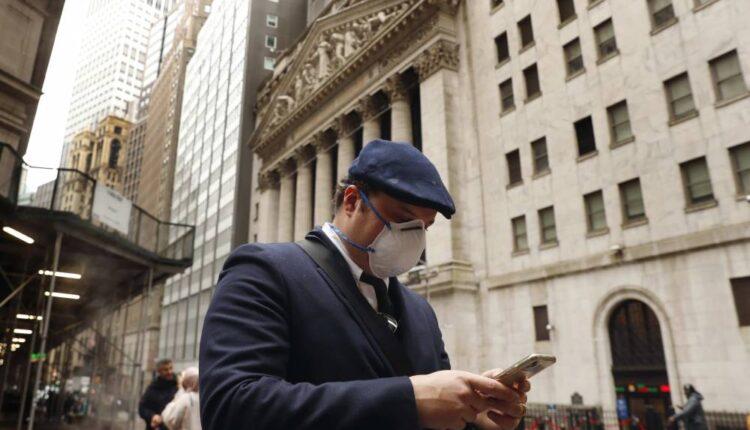A blast of earnings news is coming, but the market may be more focused on when the economy will reopen

- Netflix, IBM, Intel, Coca-Cola, and American Express are among dozens of S&P 500 companies to report earnings in the week ahead.
- But Nuveen's chief market strategist Bob Doll said earnings don't really matter now, and market focus will be more on how companies will make it through the shut downs and whether they can return to profitability in 2021.
- Markets are expected to respond more to information on the virus and when the economy will reopen than earnings or economic data.
A man wears a protective mask as he walks past the New York Stock Exchange on the corner of Wall and Broad streets during the coronavirus outbreak in New York City, New York, U.S., March 13, 2020.Lucas Jackson | Reuters
Earnings from IBM, Netflix, Coca-Cola and dozens of others are expected in the week ahead, but as the state shutdowns now reach the one-month threshold, the market is more likely to trade on virus headlines and news about reopening the economy.
There are also some important economic reports, including existing home sales on Monday and durable goods on Friday. But it is the weekly jobless claims data that will again be most relevant, as economists watch to see whether the number of workers seeking claims has now peaked and whether there are any signs some are returning to jobs, as government funds reach the hands of business owners.
In the past week, stocks were higher, but there was a divergence with the Dow up just under 2.2% at 24,242, and Nasdaq, surging 6%, lifted by tech and biotech. The S&P 500 gained 3% for the week and is now 31% off its March lows.
Stocks gained amid signs the virus outbreak has peaked and some reopenings could start slowly in the next few weeks.
The market also bounced Friday as the results of an early study of a Gilead drug showed promise with severe cases of coronavirus. Technology stocks were up about 4% for the week, and health care was up more than 5% while consumer discretionary stocks led with a gain of more than 6%.
VIDEO5:2205:22Here's how Raymond James' CIO sees a return to S&P 3000Power Lunch
"As the virus news goes, so go risk assets. People expect bad economic data," said Patrick Leary, chief market strategist at Incapital. "The data is all expected to be horrible. The only economic data we can really look at now and start to measure is the claims data on Thursday." As of April 11, more than 22 million workers claimed unemployment benefits over a four-week period, as states shut down and schools, restaurants, stores and many other businesses closed or were forced to cut back.
Charts are important
Analysts who watch stock charts say technical levels will continue to have a powerful pull on the market, since so many traders have set their computers to trade around those numbers.
For instance, the S&P 500 had a hard time breaking through the 50-day moving average Friday, and fell back after it initially edged near 2,862 in morning trading. But at the end of the trading day, it smashed through that level surging to close at 2,874, a positive sign for Monday's open. The 50-day literally is the average closing price for the S&P over the previous 50 sessions. Technical analysts believe watching moving averages gives them an important tool for price trends and momentum.
Bob Doll, Nuveen's chief equity strategist, said he believes the market hit its bear market low on March 23, but it could take another dive towards lows at some point.
"My [low] target was 2,350. We spent 36 hours below that and got to 2,192. If there's a secondary low, then probably the lowest chance is 2,350," he said. "I'm not sure we're going to go there, based on two things, the power of the rally and two, the stimulus. It's been awesome."
Doll said after the first blow-off phase to the March low, the second phase of a bear market is the type of choppy trading that results in swings both higher and lower.
"Then you get phase two, which is a whipsaw fashion and it bounces all over the place. … You kind of get dizzy, then you make the secondary low." Doll said. Then ultimately, the market moves on to where price-to-earnings ratios and earnings in general will matter again.
"What's driving the market is not earnings. What's driving it is technicals," said Doll.
What about earnings
First quarter earnings began to roll in during the past week, starting with major banks. So far, based on actual reports and forecasts, first quarter earnings are expected to be down 14.5% in the first quarter, the worst quarter since the more than 15% decline in the third quarter of 2009. As for the second quarter, a much sharper 27.3% decline is expected, according to I/B/E/S data from Refinitiv.
IBM reports Monday, while Coca-Cola, Netflix, Travelers, and Texas Instruments release results Tuesday. AT&T, Delta Airlines, and Intel, Blackstone and Eli Lily are reporting Thursday. American Express and Verizon are expected Friday.
Doll said he expects the market to listen to comments from corporate executives on conference calls but ignore the actual earnings. "The market is going to pay a lot more attention to what can a rebound look like, and what can 2021 numbers look like," he said. "They'll be selling on that versus how deep is the hole going to be in the second quarter. The macro questions around that are recurrence, therapeutics, and vaccine and how fast can the economy come back, and nobody knows the answer to that."
President Donald Trump laid out guidelines for reopening the economy, but left the decision making up to the states, which are facing varied levels of new infections. One issue is the lack of testing, and American businesses have pressed for more availability of test kits so workers can be brought back more safely.
Doll said he is partial to health care and technology stocks, and one reason is because of the Fed's quantitative easing programs. "We're now in QE4. We had QE1, QE2, QE3, and six months after QE 1, 2 and 3, there were two sectors that outperformed-technology and health care, and there were two that underperformed, utilities and REITs," he said.
Doll said he also is looking at how stocks might come through the virus shutdowns. "Part of what you want to make sure is the company is going to make it through, and make sure the industry has decent demand getting out of it. If it has decent demand during it, that's a good thing, and that takes you back to health care and technology," said Doll.
Leary said he expects companies to be scrutinized somewhat differently by analysts this quarter, and balance sheets will be more important.
"Its going to be on a case-by-case basis about how analysts are going to look at them. This is not a typical recession. Recessions seem to hit different sectors," he said, "This one one is different in that it really has several losers like airlines and travel and entertainment companies. It has some real winners too. I like health care and pharma. Anything that's defensive in nature is going to perform well."
Companies have been tapping the corporate bond market at a record pace to boost their cash piles to help them through the economy's shutdown, and the coming week should be no different.
The market has been open for business and spreads have narrowed since the Fed announced a program to buy corporate debt. Companies have issued more than $160 billion in investment grade bonds so far this month, with JP Morgan issuing $10 billion this past week in the biggest bank deal ever, according to Credit Flow Research.
More are expected in the coming week, as companies report earnings and exit the blackout period.
"I think what corporate treasurers know is the window of opportunity for issuing debt at reasonable rates will quickly close once the economy starts opening," said Leary. He said balance sheets and earnings will be more scrutinized once things start to become more normal.
"They won't have an excuse anymore … right now, everything is expected to unexpected," he said, "I think that window will close, and we'll have to take a look at the bond market again. Their ability to issue will be impacted by their balance sheets…[now] there's plenty of cash coming at them. The Fed will step in to support."
Leary said some of the interest in corporate bonds is from investors who are fearful of buying stocks right now but may want to invest in a company through the safer play of its bonds. Leary said energy bonds are among the least desirable, with the huge drop in crude prices.
West Texas Intermediate crude futures for May settled at $18.72 per barrel, it lowest level since January, 2002. But that contract expires Tuesday. The June contract settled at $25.08 per barrel, and will resume trading there next week as the active contract.
"It's just a reflection of physical market conditions," said John Kilduff of Again Capital, of the big decline in the May contract. He said it shows that futures traders do not want to actually take delivery of the commodity, due to an increasing lack of storage space.
Week ahead calendar
Monday
Earnings: IBM, Steel Dynanics, Equifax, Zions Bancorp, Ally Financial, Halliburton, Infosys, Royal Phillips, Truist Financial
Tuesday
Earnings: Coca-Cola, Netflix, Travelers, Texas Instruments, Chubb, Lockheed Martin, CIT Group, SAP, HCA Healthcare, Manpower, Prologis, Comerica, Emerson Electric, Synchrony Financial, Snap, Canadian Pacific Railways, Interactive Brokers, Teradyne
8:30 a.m. Philadelphia Fed nonmanufacturing
10:00 a.m. Existing home sales
Wednesday
Earnings: AT&T, Las Vegas Sands, Alcoa, Boston Beer, Kinder Morgan, Delta Air Lines, Baker Hughes, Quest Diagnostics, Kimberly-Clark, Nasdaq, Discover Financial, Netgear, Seagate Technology, SLM, TD Ameritrade, CSX, Biogen, Thermo Fisher, LM Ericsson
9:00 a.m. FHFA home prices
Thursday
Earnings: Intel, Blackstone Group, Eli Lily, Credit Suisse, Invesco, Huntington Bancshares, Tractor Supply, E Trade, Capital One, FirstEnergy, Hershey, Southwest Air, Union Pacific, Citrix, Domino's Pizza, PulteGroup
8:30 a.m. Weekly claims
9:45 a.m. Manufacturing PMI
9:45 a.m. Services PMI
10:00 a.m. New home sales
Friday
Earnings: American Express, Verizon, Sanofi, Eni
8:30 a.m. Durable goods
10:00 a.m. Consumer sentiment
Source: cnbc.com

